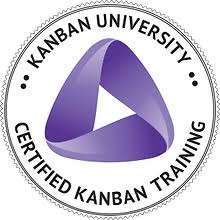Kanban System Design (KSD)

What will you receive:
- High-quality training with Accredited Kanban Trainer (AKT) Hugo Lourenço
- Online Course materials
- Membership of the Kanban University (KU)
- Kanban University (KU) certificate of course completion
- e-book
- Access to exclusive Agile Thinkers Academy Digital library
- Agile Thinkers Academy Slack community
- Agile Thinkers Academy Certificate of Attendance
Attendees will receive the Certification Credential:
High-quality instruction from our Kanban trainers with over 10 years of experience in new ways of working in the public and private sector.
This course is accredited by Kanban University (KU). Participants will receive a KSD certificate of course completion from Kanban University as well as membership of KU, and an Agile Thinkers Academy certificate of attendance.
PMI Professional Development Units (PDU)
Attendees may be eligible to apply for PDU towards their continuing education requirements with PMI
Description
The Kanban Systems Design - KSD lays the foundations of the Lean Kanban method teaching you the principles, practices and processes. This 4 half-day online course is certified by Kanban University and has been put together by Kanban experts and leaders including David Cunha and Hugo Lourenço.
Objectives
The course follows the official KU Certified Kanban syllabus. During the two days you will have ample opportunities to discuss and experience the following topics:
Experience Kanban
- Full simulation using the get Kanban game or similiar options
Definition of Kanban
- Foundational Principles
- Core Practices
- The Kanban Lens
- The Kanban Values
Understanding Kanban
- Visualisation
- Pull-Based Systems
- Commitment in Kanban
- Replenishment and Planning
- Delivery of Products
- Lead and End-to-End Cycle Times
- Little’s Law
- Cumulative Flow Diagrams
- Flow Efficiency
- Metrics in Kanban Systems
Implementing Kanban
- STATIK - Systems Thinking Approach to Implementing Kanban
- Understanding Sources of Variability
- Identifying Opportunities to Improve
- Analysing Demand and Capability
- Modelling Workflow
- Designing a Kanban System
- Work Item Types
- Classes of Service
Kanban Board Design
- Designing Kanban Ticket
- Examples of Visual Kanban Boards
Course Audience
Kanban works across multiple functions of an organisation, from senior members of staff looking to adopt Lean Management to members of delivery teams willing to improve their working practices. Previous KSD attendees have been in roles such as:
- Senior Managers
- Program and Project Managers
- Product Managers, Product Owners and Business Analysts
- Scrum Masters, Team Leads and Change Agents
- Product & Software Developers & Testers
- Agile Coaches & Practitioners (Scrum, XP, DSDM, AgilePM, etc.)
- Other roles such as HR and Finance professionals
Prerequisites
This course does not have any pre-requisites except reading chapter 4 and get the basis of Kanban previously. If you have attended a TKP course then you will be fine to start with KSD without previous reading.

Training Remotely | Guidelines for a Successful Experience

Congratulations on joining Agile Thinkers remote courses. We are committed to facilitating a pleasant and enriching experience for all our attendees.
That's is why it is critically important that we are clarifying how we're going to work together to be most effective. So, let's develop some working agreements and suggestions to encourage the type of team environment that we want to foster during our training sessions.
Before the training starts:
1. Inform your co-workers/colleagues what will be the time you're attending training, and you shouldn't' be interrupted;
2. Look for a comfortable and quiet place to set your training spot;
3. Reduce distractions, noises and background interference;
4. Test your internet signal and guarantee you have a good connection;
5. Please please take some time to explore the tools and how to login;
6. Visit the toilet 10m before the session starts;
7. Stay hydrated;
8. Bring a notebook and a pen with you;
9. Limit interruptions from family members;
10. Make sure you turn off Outlook, gmail, Slack, WhatsApp, Skype or other sources of interruption;
11. If you can, select flight mode on your phone;
12. Test your earphones.
During Training:
1. While there are no questions, confirm you are mute;
2. Ask for help if you have any questions unmuting yourself or sending a message in chat;
3. Use Chat area to address the trainer some questions. As soon as possible, we will give feedback.
4. Respect the Time-boxes;
5. Be on time so you can deliver on time;
6. Don't accept calls while you're on training unless is extremely necessary and vital for you;
7. Please keep your camera on;
8. It's completely forbidden for students to record audio or video of any kind or take pictures from the sessions without written agreement;
9. For training. and quality assurance purpose of our staff, we can record video, audio and the chat of all sessions;
10. Have fun! Enjoy your course!
Make sure you also check our FAQs
All trademarks mentioned are the property of their respective owners.
